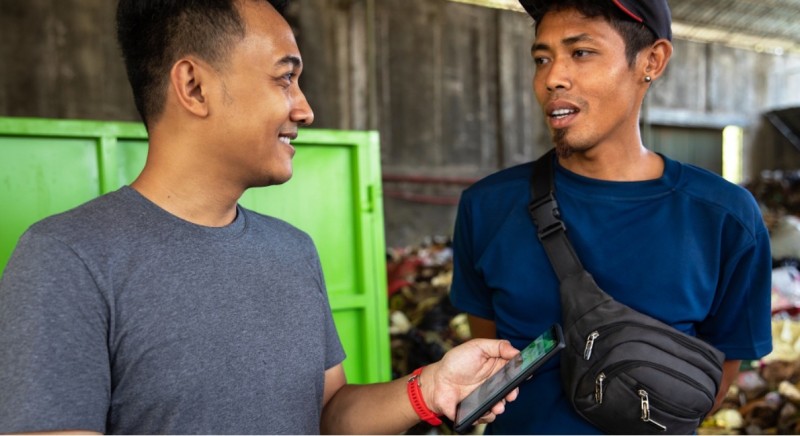For decades, trash collection in Indonesia was not carried out systematically. Rubbish collected in Indonesia was simply thrown away, with no records or data of the collection, much less in a digital format. Given Indonesia’s sprawling size, it was inevitable that some areas were not getting the waste collection services required, leading to excess waste and pollution.
“There was no data [from the government or any other institutions] to see what was going on the ground at the time,” says Gringgo’s CEO and co-founder Febriadi Pratama in an interview with The Edge Singapore.
Photo: Gringgo
Aiming to change the way things are done, Gringgo offers two main products: Envi and G-Collect. Envi digitises the waste management system in Indonesia onto a common web dashboard or mobile application for administrators and waste collectors to access. At the same time, G-Collect focuses on streamlining the collection of data in the local waste management ecosystem for institutions to track how they can better improve their operations.
“Data collection [in this space] has proven to be so crucial,” emphasises Pratama. “[Simply] tapping into three or four organisations to see how each one works can shed light on key aspects of this industry, which will better allow us to work with these companies to advise and build systems for them to operate in more sustainable ways.”
Gringgo is now active in four major cities: Denpasar, Makassar, Bandung and Surabaya. Pratama shares that several regional partnerships with companies in the Philippines and India are also in the works, with plans to go beyond Southeast Asia by 2026.
See also: What is water really worth in Southeast Asia?
The way Pratama sees it, this industry is one that still needs a lot of effort for it to be efficient. Hence, rather than focusing on competing with other large waste management companies, Pratama sees Gringgo’s role as complementing their work. “Our intention has never been to replace any of the work that many companies in the space have been doing, but merely to improve [the efficiency levels] of existing processes [for an ecosystem with higher functionality to exist],” he adds.
Gringgo has drawn attention in the Google AI Impact Challenge in 2019, where it was one of the 20 selected grantees to receive a US$500,000 funding, as well as support from Google’s launchpad accelerator programme.
Gringgo still enjoys some support from Google years after the challenge has ended, and Pratama acknowledges the importance of grants, funding and support for start-ups and SMEs in this space to grow and push out their ideas.
For venture capital players like Circulate Capital, this is their goal — to provide the support needed to these start-ups. Circulate Capital focuses on tackling the ocean plastic pollution problem by working towards financing companies, infrastructure and projects to mitigate the flow of plastic waste to oceans worldwide.
Regula Schegg, managing director, Asia, at Circulate Capital, stresses the need for a big-picture approach when working with companies on the ground, in order to best effect long-lasting change in the waste management space.
Photo: Albert Chua/The Edge Singapore
To stay ahead of Singapore and the region’s corporate and economic trends, click here for Latest Section
“[Allocating] capital is one thing, but when we look at the holistic problem [of waste] and the solutions we want to provide, it is important that we develop and support the ecosystem behind it,” explains Schegg. “Many times, this ecosystem entails [engaging with] communities — people who are impacted by the waste.”
Often, these impacted people are also part of the solution, as they have their eyes and ears on the ground and the best knowledge on the current landscape and the issues faced.
As such, Schegg shares how Circulate Capital has worked towards stretching the breadth of its services, from assisting in scaling projects and offering technical assistance with its partners, to providing mentorship and recruiting talent for companies in this space, instead of merely providing financial capital for them.
Many of the companies that Circulate Capital helps are early-stage start-ups in the space that aim to offer a wide range of solutions across the supply chain — from improving the collection of plastic waste to enhancing the methods and efficiency levels of plastics recycling.
“Disruptive innovation [in the work towards better recycling] is the key component to incubate circular solutions for our future,” says Schegg. “This is what it means to work on community-driven solutions that drive not only financial returns, but more importantly long-standing social and environmental change.”
For relatively mature markets like Singapore, the waste industry is the domain of several large companies such as government-linked Sembcorp Industries. There are privately-held SMEs, such as Wah & Hua, that are constantly finding new ways to grow by leveraging on the latest technologies of products and services.
The homegrown company was set up in 1978 by Steven Tan with just one truck. Since then, the company has grown to provide multi-material recycling and waste management services for the collection of recyclables materials from small businesses to large corporations. Last year, it launched its own waste-to-energy plant as well.
The company is now run by Tan’s daughter Melissa, who also chairs the Waste Management and Recycling Association of Singapore.
In recent years, with the spotlight shining on sustainability and waste management efforts, Wah & Hua has caught the attention of regional waste management player Blue Planet Environmental Solutions, which acquired the privately-held company in March last year for an undisclosed sum.
In addition, Enterprise Singapore is supporting Wah & Hua to help the company realise its local growth plan to launch a waste-to-energy facility that will be fully automated and programmed by robots to recognise and sort different recyclable materials.
Cover Photo: Google



